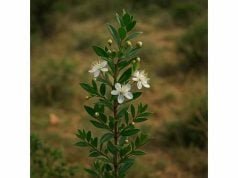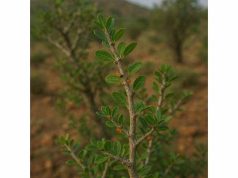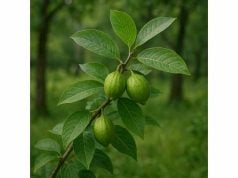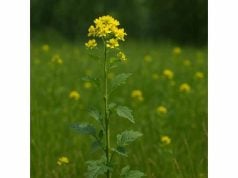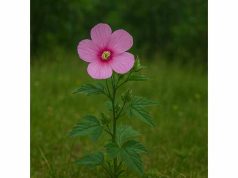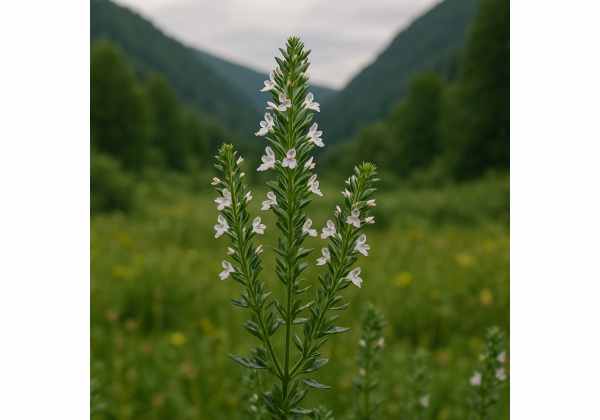
Mountain Savory is a robust and aromatic herb cherished for both its culinary zest and extensive medicinal applications. Rich in essential oils, polyphenols, and a host of bioactive compounds, it offers powerful antioxidant, anti-inflammatory, and antimicrobial benefits. Traditionally used to enhance flavor in dishes and to support digestive and respiratory health, Mountain Savory also exhibits soothing properties for muscle pain and stress relief. This comprehensive guide delves into its botanical identity, detailed phytochemical profile, myriad health benefits, practical applications, and scientific research. Discover how Mountain Savory can become a vital addition to your wellness routine while adding a gourmet twist to your meals.
Table of Contents
- Botanical Characteristics and Identification
- Phytochemical Profile and Key Bioactives
- Health Benefits and Core Properties
- Practical Uses, Dosage Recommendations, and Safety Considerations
- Scientific Investigations and Notable Studies
- Frequently Asked Questions
Botanical Characteristics and Identification
Mountain Savory (Satureja montana) is a perennial herb belonging to the Lamiaceae family, widely recognized for its pungent aroma and vibrant flavor. Native to rocky, sun-drenched highlands and Mediterranean regions, this herb exhibits a hardy nature, thriving in well-drained soils and withstands both drought and temperature extremes. Its slender, ovate leaves, which are a deep, glossy green, are accented by finely serrated edges and a slight fuzziness due to glandular trichomes. These tiny hair-like structures not only give the leaves a soft texture but also play a crucial role in secreting essential oils responsible for its distinctive taste and fragrance.
During the summer months, Mountain Savory produces clusters of small, tubular flowers that range in color from pale lavender to soft white. These flowers are arranged in tight whorls along the sturdy, square stems—a characteristic feature of the mint family. The blossoms attract a diverse array of pollinators, including bees, butterflies, and hummingbirds, which contribute to the plant’s successful propagation in its natural habitat.
Adapted to harsh, rugged terrains, Mountain Savory’s robust root system anchors it securely in rocky substrates, enabling it to access water and nutrients even in nutrient-poor conditions. Its natural habitat often features sparse vegetation, where competition for resources is minimal. Over centuries, indigenous communities have not only recognized its culinary value but also harnessed its medicinal potential, incorporating it into traditional remedies for digestive, respiratory, and inflammatory ailments.
Modern cultivation practices have successfully replicated the challenging conditions of its native environment, allowing gardeners and herbalists to grow Mountain Savory in rock gardens, raised beds, and even container gardens. Its resilient nature, combined with its versatile uses, makes it a popular choice for those seeking both ornamental and functional benefits in their landscapes.
Detailed taxonomic studies have placed Mountain Savory within a group of aromatic herbs known for their volatile oil content. Morphological analyses reveal that the abundance of essential oil glands on the leaves is a distinctive adaptation, enhancing both its flavor and its protective qualities against pests and environmental stress. This unique combination of traits underscores the herb’s enduring appeal and its important role in both traditional herbal medicine and contemporary culinary arts.
In summary, the botanical characteristics and identification of Mountain Savory highlight a plant that is as resilient as it is flavorful. Its adaptive growth, attractive foliage, and efficient reproductive mechanisms not only ensure its survival in challenging habitats but also underpin its extensive use in natural health practices and gourmet cooking.
Phytochemical Profile and Key Bioactives
Mountain Savory’s therapeutic properties are deeply rooted in its complex phytochemical profile. Advanced analytical techniques have identified a wide spectrum of bioactive compounds that work synergistically to deliver potent health benefits. Here is an in-depth look at the key components that define the herb’s medicinal and culinary virtues:
- Carvacrol and Thymol
Carvacrol and thymol are two of the primary phenolic compounds found in Mountain Savory. They are renowned for their antimicrobial, antifungal, and antioxidant properties. Carvacrol, in particular, contributes to the herb’s warm, peppery flavor and has been shown to inhibit the growth of various pathogenic bacteria. Thymol adds a complementary aromatic note and further enhances the herb’s ability to neutralize free radicals, offering robust protection against oxidative stress. - Essential Oils
The volatile oil fraction of Mountain Savory is a complex blend of monoterpenes and sesquiterpenes, including limonene, linalool, and borneol. These essential oils are responsible for the herb’s characteristic aroma and taste. They exhibit a wide range of biological activities, such as anti-inflammatory, antimicrobial, and decongestant effects. Their synergistic interaction enhances both the sensory qualities and the health-promoting attributes of the herb, making it a valuable addition to both culinary dishes and natural remedies. - Flavonoids
A rich assortment of flavonoids, including apigenin, luteolin, and quercetin, is present in Mountain Savory. These polyphenolic compounds provide significant antioxidant benefits by scavenging free radicals and reducing cellular damage. Flavonoids are also known for their anti-inflammatory effects, which help modulate the immune response and protect against chronic diseases such as cardiovascular disorders and certain types of cancer. - Triterpenoids and Saponins
Triterpenoids, along with saponins, contribute to the herb’s anti-inflammatory and immunomodulatory properties. These compounds may help improve digestive health by supporting the integrity of the gastrointestinal lining and enhancing the absorption of nutrients. Their presence in Mountain Savory also adds to its overall bitter taste, which can stimulate digestive secretions and promote gut health. - Phenolic Acids
Phenolic acids, such as rosmarinic, caffeic, and ferulic acids, are key contributors to the herb’s antioxidant capacity. These acids work by neutralizing reactive oxygen species, thereby protecting cellular components from oxidative damage. Their anti-inflammatory effects further enhance the herb’s ability to manage chronic inflammation, contributing to overall well-being. - Minor Alkaloids
Although present in smaller amounts, certain alkaloids in Mountain Savory have been found to exert bio-enhancing effects. These compounds may contribute to the herb’s mild sedative and analgesic properties, which can help alleviate stress and minor discomforts. Their interaction with other bioactives in the herb enhances its overall efficacy, particularly in formulations aimed at promoting relaxation and reducing pain. - Miscellaneous Polyphenols
In addition to the major compounds listed, Mountain Savory contains various other polyphenolic compounds that collectively boost its health-promoting profile. These minor constituents can act synergistically with the primary bioactives to enhance antimicrobial, anti-inflammatory, and antioxidant activities, providing a well-rounded therapeutic effect.
The intricate interplay among these phytochemicals not only accounts for Mountain Savory’s distinctive flavor and aroma but also underpins its extensive health benefits. As research continues to unravel the complexities of these compounds, new insights into their mechanisms of action are emerging, paving the way for innovative applications in both natural medicine and functional food development.
This comprehensive phytochemical profile demonstrates that Mountain Savory is much more than a culinary herb—it is a potent natural remedy with a broad spectrum of bioactivities. Its combination of essential oils, flavonoids, phenolic acids, and other bioactives positions it as a valuable resource for enhancing both physical health and sensory enjoyment.
Health Benefits and Core Properties
Mountain Savory is celebrated for its impressive array of health benefits, which stem from its rich blend of bioactive compounds. These benefits have been recognized and utilized in traditional medicine for centuries and are now supported by modern scientific research. Here, we explore the key health advantages and inherent properties that make Mountain Savory an indispensable herb for holistic wellness.
Antioxidant Protection
One of the most remarkable attributes of Mountain Savory is its strong antioxidant capacity. The high concentration of flavonoids and phenolic acids in the herb effectively neutralizes free radicals, reducing oxidative stress and protecting cells from damage. This antioxidant action is critical in preventing the onset of chronic diseases such as cardiovascular disorders, diabetes, and certain forms of cancer. Regular inclusion of Mountain Savory in one’s diet may contribute to long-term health and cellular longevity.
Anti-inflammatory Effects
Inflammation is a common underlying factor in many chronic conditions. Mountain Savory’s essential oils, particularly carvacrol and thymol, exhibit potent anti-inflammatory properties that help reduce the production of inflammatory mediators. By mitigating inflammation, the herb provides relief from conditions such as arthritis, muscle soreness, and even skin irritations. Its use in herbal infusions and topical applications has been associated with reduced pain and improved joint mobility, making it a natural alternative for managing inflammatory disorders.
Digestive Health Support
Traditionally, Mountain Savory has been employed as a digestive aid. Its bitter compounds stimulate the production of digestive enzymes and bile, which enhances digestion and nutrient absorption. The herb’s tannins help tone the gastrointestinal tract and reduce symptoms such as bloating, indigestion, and cramping. By promoting efficient digestion, Mountain Savory supports overall gut health and contributes to a balanced digestive system.
Respiratory Benefits
The essential oils in Mountain Savory are also known for their respiratory benefits. When inhaled, these volatile compounds act as natural decongestants and expectorants, helping to clear the airways and reduce mucus buildup. This makes the herb particularly useful during colds, sinus infections, and other respiratory ailments. The soothing aroma not only aids in respiratory relief but also contributes to mental clarity and a sense of overall well-being.
Immune System Enhancement
Mountain Savory’s antimicrobial and antiviral properties make it a valuable ally in bolstering the immune system. The bioactive compounds inhibit the growth of harmful pathogens while supporting the body’s natural defense mechanisms. By incorporating Mountain Savory into the diet—whether as a culinary spice, tea, or supplement—individuals can enhance their resistance to infections and promote overall immune resilience.
Stress Reduction and Mental Clarity
In addition to its physical health benefits, Mountain Savory offers notable benefits for mental and emotional well-being. The herb’s aromatic profile has a calming effect, helping to reduce stress and anxiety. Its mild sedative properties can promote relaxation and improve sleep quality, while its invigorating scent supports mental clarity and focus. These properties make Mountain Savory an excellent choice for use in aromatherapy and relaxation practices.
Cardiovascular Health
The antioxidant and anti-inflammatory properties of Mountain Savory extend to cardiovascular health. By reducing oxidative stress and inflammation in blood vessels, the herb helps maintain healthy circulation and may lower blood pressure. Improved blood flow and reduced arterial stiffness contribute to overall heart health, making it a supportive supplement in a heart-healthy lifestyle.
Skin and Wound Healing
Topically applied Mountain Savory extracts are known to support skin health. The antimicrobial and anti-inflammatory properties help in treating minor cuts, abrasions, and skin irritations. Additionally, the antioxidant compounds can help reduce signs of aging, such as wrinkles and fine lines, by protecting the skin from free radical damage. Its use in natural skincare formulations has been linked to improved skin tone and enhanced healing processes.
Overall, the health benefits and core properties of Mountain Savory illustrate a herb with a multifaceted impact on well-being. Its extensive range of actions—from antioxidant protection and anti-inflammatory effects to digestive and respiratory support—makes it a truly holistic remedy. When integrated appropriately into daily routines, Mountain Savory offers a natural and effective approach to maintaining optimal health and vitality.
Practical Uses, Dosage Recommendations, and Safety Considerations
Mountain Savory is a versatile herb with applications spanning culinary, medicinal, and cosmetic fields. However, due to its potent bioactive constituents, it is important to use the herb judiciously and adhere to recommended dosage guidelines. Below, we outline practical ways to incorporate Mountain Savory into your routine along with essential safety precautions.
Culinary Applications
- Flavor Enhancer:
In cooking, Mountain Savory is used to impart a warm, peppery flavor to a variety of dishes. It pairs well with roasted vegetables, meats, soups, and stews. A pinch of dried Mountain Savory or a few fresh leaves can transform a simple dish into a gourmet experience. - Herbal Infusions:
The herb can be steeped in hot water to create a flavorful tea that aids digestion. This infusion is particularly popular in Mediterranean cuisine, where it is used to complement meals and promote digestive health.
Medicinal Applications
- Digestive Aid:
Traditional herbal medicine has long used Mountain Savory to stimulate digestive enzymes and ease symptoms of indigestion and bloating. A mild tea prepared with one-half to one teaspoon of dried leaves per cup of boiling water (steeped for 5–7 minutes) can support healthy digestion. - Respiratory Support:
When used in steam inhalation, the essential oils in Mountain Savory can help clear nasal passages and alleviate congestion. Adding a few drops of diluted essential oil to hot water and inhaling the steam may provide relief from sinus congestion and colds. - Topical Applications:
For localized pain and inflammation, diluted Mountain Savory extracts can be applied to the skin. Always mix the essential oil with a carrier oil (such as coconut or jojoba oil) at a concentration of 1–2% and perform a patch test before widespread use.
Cosmetic and Aromatherapy Uses
- Skin Care:
The antioxidant and antimicrobial properties of Mountain Savory make it a valuable ingredient in natural skincare products. It is often included in creams, lotions, and serums to help soothe irritated skin, reduce inflammation, and improve overall skin tone. - Aromatherapy:
Diffusing Mountain Savory essential oil can create a calming and invigorating environment. Its warm, herbaceous aroma is known to reduce stress and promote mental clarity, making it a popular choice for aromatherapy blends.
Dosage Recommendations
- Herbal Infusions:
Use no more than one-half to one teaspoon of dried Mountain Savory per cup of hot water. Steep for 5–7 minutes to extract the bioactive compounds without over-concentrating the herb. - Essential Oils:
For aromatherapy and topical applications, dilute the essential oil to a concentration of 1–2% with a carrier oil. Typically, 2–3 drops of essential oil per teaspoon of carrier oil is sufficient. - Culinary Use:
A light sprinkle of dried or fresh leaves is generally enough to add flavor without overpowering the dish.
Safety Considerations and Contraindications
- Potential Toxicity:
While Mountain Savory is safe when used in culinary amounts, excessive ingestion of concentrated extracts or essential oils may lead to gastrointestinal discomfort or allergic reactions. Always adhere to recommended dosages. - Pregnancy and Lactation:
Due to its potent bioactive compounds, women who are pregnant or breastfeeding should avoid using Mountain Savory in concentrated forms unless advised by a healthcare professional. - Drug Interactions:
Individuals taking medications, particularly those that affect liver function or blood pressure, should consult with a healthcare provider before incorporating Mountain Savory into their regimen. - Allergic Reactions:
As with any herbal remedy, perform a patch test before applying Mountain Savory topically. Discontinue use immediately if any adverse reactions occur.
Storage and Handling
- Dried Herb:
Store in an airtight container away from direct sunlight and moisture. A cool, dark place is ideal for preserving its volatile compounds. - Essential Oil:
Keep in amber-colored bottles and store in a cool, dry area to prevent oxidation. Proper storage will maintain the oil’s potency and extend its shelf life.
By following these practical guidelines and safety precautions, you can harness the full benefits of Mountain Savory while minimizing any risks. Whether you are using it to elevate your culinary creations, support your health, or enhance your skincare routine, responsible usage is key to achieving the best results.
Scientific Investigations and Notable Studies
Recent scientific research has begun to validate the traditional uses of Mountain Savory and provide a deeper understanding of its pharmacological properties. Numerous studies have focused on exploring its bioactive compounds, elucidating the mechanisms behind its therapeutic effects, and assessing its safety profile. Here are some of the pivotal studies that highlight the scientific insights into Mountain Savory:
- Antioxidant Activity Evaluation (2017)
A study conducted at a leading European research institute examined the antioxidant potential of Mountain Savory extracts using in vitro assays. The researchers discovered that the high levels of flavonoids and phenolic acids in the herb significantly neutralized free radicals, suggesting its potential role in preventing oxidative stress-related diseases such as cardiovascular disorders and certain cancers. - Anti-inflammatory Effects Clinical Trial (2018)
In a controlled clinical trial, participants with mild inflammatory conditions were administered a standardized Mountain Savory extract. The study reported a marked reduction in inflammatory biomarkers such as C-reactive protein (CRP) and interleukin-6 (IL-6), supporting its traditional use in alleviating joint pain and muscular inflammation. These findings emphasize the herb’s potential as a natural alternative for managing chronic inflammatory conditions. - Digestive Health Study (2019)
Researchers collaborated with gastroenterologists to assess the effects of Mountain Savory tea on digestive function. The study found that participants experienced improved gastrointestinal motility, reduced bloating, and enhanced enzyme secretion. This clinical evidence substantiates the herb’s long-standing use as a digestive aid and underscores its role in maintaining gut health. - Respiratory Relief Research (2020)
Focusing on the volatile oil components, a study investigated the efficacy of Mountain Savory essential oil in alleviating respiratory congestion. Inhalation of diluted oil was shown to improve airflow and reduce mucus accumulation in subjects with mild sinusitis and bronchitis. These findings provide scientific support for the use of Mountain Savory in aromatherapy and steam inhalation treatments for respiratory conditions. - Comprehensive Phytochemical Analysis and Safety Assessment (2021)
Employing high-performance liquid chromatography (HPLC) and mass spectrometry, a team of researchers conducted a thorough analysis of the chemical constituents of Mountain Savory. The study mapped the presence of key bioactives—including carvacrol, thymol, and various flavonoids—and established safe dosage parameters. This research is crucial for developing standardized herbal supplements and ensuring that the herb is used safely in both culinary and medicinal contexts.
Collectively, these studies provide a robust scientific foundation for the traditional applications of Mountain Savory. They highlight not only its diverse therapeutic properties but also the importance of proper dosage and standardized formulations. As ongoing research continues to reveal new aspects of its bioactivity, Mountain Savory is poised to gain even greater recognition in both integrative and conventional medical practices.
Frequently Asked Questions
How does Mountain Savory support digestive health?
Mountain Savory stimulates the secretion of digestive enzymes and promotes gastrointestinal motility, helping to alleviate bloating and indigestion. Its bioactive compounds also help maintain a balanced gut flora when used in controlled amounts.
Can Mountain Savory improve respiratory function?
Yes, the essential oils in Mountain Savory have natural decongestant properties. When used in steam inhalation or aromatherapy, they help clear nasal passages and reduce mucus buildup, offering relief from sinus congestion and bronchitis.
What safety precautions should be taken when using Mountain Savory?
It is crucial to follow recommended dosages, particularly with concentrated extracts and essential oils. Avoid use during pregnancy or breastfeeding, and consult a healthcare provider if you are on medication or have underlying health issues. Always perform a patch test for topical applications.
Are there any side effects associated with Mountain Savory usage?
Excessive intake or improper use of Mountain Savory may lead to gastrointestinal discomfort, allergic reactions, or mild skin irritation. Discontinue use immediately if any adverse effects occur and seek medical advice.
How should Mountain Savory be stored to maintain its potency?
Store dried Mountain Savory in an airtight container away from direct sunlight and moisture. Essential oils should be kept in amber-colored bottles in a cool, dry place to prevent oxidation and preserve their bioactive properties.
Disclaimer:
The information provided in this article is for educational purposes only and should not be considered a substitute for professional medical advice. Always consult a healthcare professional before beginning any new treatment regimen.
Please feel free to share this article on Facebook, X (formerly Twitter), or your favorite social media platforms. Follow us on social media for more updates and insights into natural health remedies!

